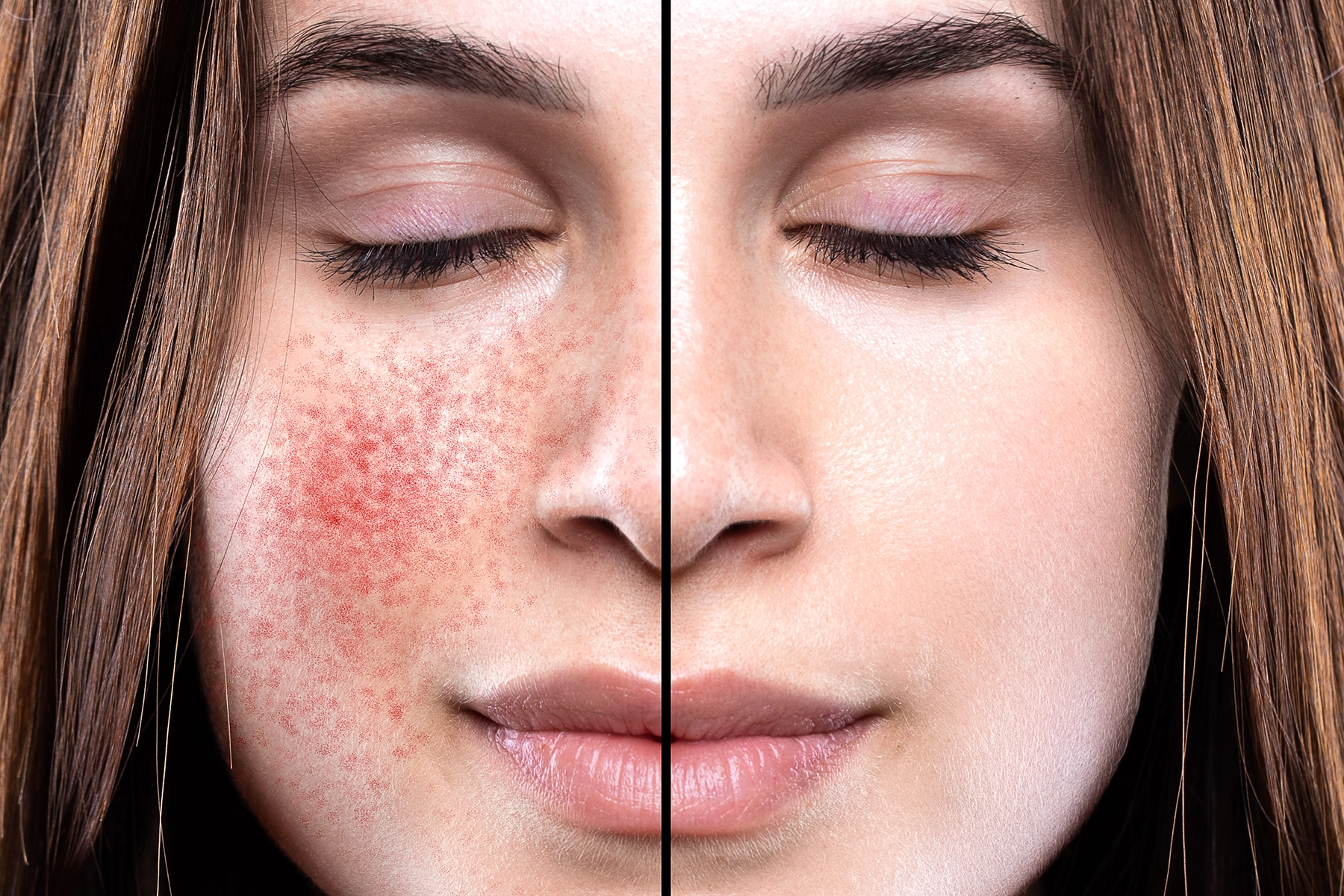What Can You Do About Rosacea?

We all get rosy cheeks from time to time. But when those rosy cheeks are frequent, worse than usual or accompanied by other symptoms such as acne-like bumps, pain or other facial symptoms, then you may have rosacea.
The National Rosacea Society says the condition is more common than many people realize. According to their data, it impacts over 16 million Americans and up to 415 million people worldwide. Despite this, 95% of people knew very little about it before their diagnosis, according to a recent survey.
What are the 4 types of rosacea?
The first thing to understand about rosacea are the four main types and the symptoms they typically produce, says Scott Elman, M.D., a dermatologist at the University of Miami Health System and Director of Outpatient Dermatology Services at Jackson Memorial Hospital.
Papulopustular rosacea
Dr. Elman says that this type of rosacea is easy to identify because, along with redness, you’ll see acne-like bumps or pustules on the face.
Erythematotelangiectatic rosacea
This type is a little trickier, as facial redness is the most typical symptom here. “Patients with this form of rosacea tend to experience stinging or burning of the skin,” says Dr. Elman. “They also may have triggers that make it worse and cause episodes of flushing, such as spicy foods, hot foods, wine, and caffeine, to name a few.”
Phymatous rosacea
With this form, chronic inflammation of the skin and larger oil-producing glands can lead to enlargement or distortion of the nose.
Ocular rosacea
This form of rosacea tends to produce a gritty sensation in the eyes.
What causes rosacea?
Despite being relatively common, the causes of rosacea are still poorly understood.
The American Academy of Dermatology says that family history, bacteria and mites that commonly live in people, and the body’s own immune system can all play a role. The National Rosacea Society adds that rosacea is also associated with underlying diseases such as heart disease, gastrointestinal issues, autoimmune diseases, and even some forms of cancer.
Regarding triggers, Dr. Elman says it’s usually items you consume or sun exposure that can lead to episodes or worsening symptoms.
“Hot beverages, spicy foods, chocolate, alcohol and sun exposure are some of the most common,” he says.
A recent discovery related to rosacea is the role of a common skin mite.
“Many patients with rosacea have increased numbers of demodex mites that live in the skin,” says Dr. Elman. “These mites may aggravate the disease, and specific treatment of these mites may lead to relief.”
Can rosacea be cured?
While there is, unfortunately, no cure for rosacea, the good news is that most cases can be managed through trigger avoidance and proper protection from the sun. Visit your dermatologist if the rosacea symptoms are bothersome or cause problems in your daily life. He says that effective treatments are available regardless of what symptoms are occurring, whether it’s common redness, bumps, eye irritation, or changes to the nose. These can range from topical ointments and creams to oral medication to laser treatments.
The National Rosacea Society adds that it’s also a good idea to talk to your dermatologist about your skincare routine. Patients with rosacea may need to use mild and non-abrasive cleansers, soft, gentle towels and cloths, and also be careful with their sunscreen and cosmetic choices.
Wyatt Myers is a contributor for UHealth’s news service.
Sources
1)Interview with Scott Elman, M.D., dermatologist at the University of Miami Health System and Director of Outpatient Dermatology Services at Jackson Memorial Hospital.
2)What is Rosacea?, National Rosacea Society, 2023, https://www.rosacea.org/?gad_source=1&gclid=Cj0KCQiA35urBhDCARIsAOU7Qwmu9RHgd0CJFHVFGs_QcY9Ww31mc2dj4kR-Auzn6Y8eIrqDgYSBKMIaArs0EALw_wcB
3)Rosacea: Who Gets and Causes, American Academy of Dermatology, 2023, https://www.aad.org/public/diseases/rosacea/what-is/causes
4)All about Rosacea: Signs & Symptoms and Treatment, National Rosacea Society, 2023,https://www.rosacea.org/patients/all-about-rosacea
Tags: Dr. Scott Elman, pink cheeks, rosy cheeks, skin care in Miami
